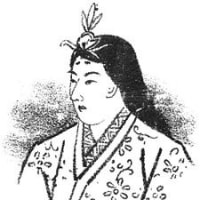『日本書紀』安閑天皇 4
大伴大連金村奏稱「宜以小墾田屯倉與毎國田部給貺紗手媛、以櫻井屯倉一本云「加貺茅渟山屯倉也。」與毎國田部給賜香々有媛、以難波屯倉與毎郡钁丁給貺宅媛。以示於後、式觀乎昔。」詔曰「依奏施行。」
閏十二月己卯朔壬午、行幸於三嶋、大伴大連金村從焉。天皇使大伴大連、問良田於縣主飯粒。縣主飯粒、慶悅無限、謹敬盡誠。仍奉獻上御野・下御野・上桑原・下桑原幷竹村之地凡合肆拾町。大伴大連、奉勅宣曰「率土之下、莫匪王封。普天之上、莫匪王域。故先天皇、建顯號垂鴻名、廣大配乎乾坤、光華象乎日月、長駕遠撫、横逸乎都外、瑩鏡區域、充塞乎無垠、上冠九垓、旁濟八表、制禮以告成功、作樂以彰治定、福應允致、祥慶符合於往歲矣。今汝味張、率土幽微百姓、忽爾奉惜王地、輕背使乎宣旨。味張、自今以後、勿預郡司。」
於是、縣主飯粒、喜懼交懷、廼以其子鳥樹獻大連爲僮竪焉。於是、大河內直味張、恐畏永悔、伏地汗流、啓大連曰「愚蒙百姓、罪當萬死。伏願、毎郡、以钁丁春時五百丁・秋時五百丁奉獻天皇、子孫不絶。藉此祈生、永爲鑒戒。」別以狹井田六町賂大伴大連。蓋三嶋竹村屯倉者、以河內縣部曲爲田部之元於是乎起。
≪英訳≫
Ōtomo no Ōmuraji Kanamura reported to the Emperor, saying, “It would be appropriate to grant the rice fields of the Oharida (小墾田) palace and the tanabe (田部, agricultural workers) from each province to Satehime (紗手媛). Also, please grant the Sakurai (桜井) rice fields and the tanabe from various provinces to Kakari-hime (香香有媛). Finally, please grant the Naniwa (難波) rice fields and the kwayorobo (钁丁, a type of laborer similar to tanabe) from each district to Yakahi-hime (宅媛). These actions will serve as a legacy for future generations, preserving the memory of the past.”
The Emperor gave a decree, saying, “Proceed as you have advised.”
In the leap month of December, on the 4th day, the Emperor made a royal visit to Mishima (三嶋 大阪府). Ōtomo no Ōmuraji Kanamura accompanied him. The Emperor instructed Kanamura to inquire about fertile lands from Agatanushi Iibo (縣主飯粒), the local governor. Iibo, filled with joy, sincerely offered his loyalty and respect. As a result, he donated lands totaling 40 chō (町), which included Upper Mino (上御野), Lower Mino (下御野), Upper Kuwahara (上桑原), Lower Kuwahara (下桑原), and the area of Takafu (竹村).
Ōtomo no Ōmuraji Kanamura, upon receiving the imperial decree, declared, “Under the heavens, there is no land that is not the Emperor’s domain. Across all territories, none is outside his realm. The previous Emperor made his illustrious name known, and his reign was as vast as the heavens and the earth, and as radiant as the sun and the moon. He extended his rule far beyond the capital, nurturing the people. His benevolence reached the ends of the earth, and his authority spread in all directions. He established rites and music to celebrate the stability of his governance. These blessings of prosperity responded fully, and the signs of good fortune mirrored the prosperous years of the past. Yet, despite this, you, Ajihari (味張), a mere subject, dared to defy the imperial authority by withholding royal land. From now on, you are dismissed from your position as district official.”
Upon hearing this, Iibo, the Agatanushi, was filled with both joy and fear. He presented his son, Toriki (鳥樹), to Ōtomo no Ōmuraji Kanamura as a boy servant.
Ōshikōchi no Ajihari (大河内直味張), struck with fear, fell to the ground, sweating profusely, and said to the Ōmuraji, “We are foolish people, deserving of death countless times over. However, I humbly ask for your mercy. From now on, we will offer 500 kwayorobo laborers each spring and 500 in autumn to the Emperor, ensuring this continues through future generations. I beg for forgiveness and pledge that this will be a lasting lesson.”
Additionally, Ajihari offered six chō (町) of the Saida (狭井田) land in Kawachi (河内) to Ōtomo no Ōmuraji as a tribute. It is believed that this marks the beginning of using the provincial people of Kawachi as laborers for the Takafu (竹村) palace storehouses in Mishima (三嶋).
≪この英文の和訳≫
大伴大連金村(おおとものおおむらじかなむら)が天皇に奏上し、「小墾田(おはりだ)の屯倉(みやけ)と各国の田部(たべ 農民)を紗手媛(さてひめ)にお与えください。また、桜井の屯倉と諸国の田部を香香有媛(かかりひめ)にお与えください。さらに、難波(なにわ)の屯倉と郡(こおり)ごとの钁丁(くわよろぼ、田部に似た農民)を宅媛(やかひめ)にお与えください。これらの行為は、後世に残し、古き時代を忘れないためのものであります」と申し上げた。
天皇は「お前の言う通りに施行しよう」と詔を下された。
閏十二月四日、天皇は三嶋(みしま 大阪府三島)に行幸された。大伴大連金村も随行した。天皇は金村を遣わし、県主(あがたぬし)である飯粒(いいぼ)に良田の所在を問わせた。飯粒はこの上なく喜び、誠心誠意を尽くして天皇に仕えた。そこで、上御野(かみのみの)、下御野(しものみの)、上桑原(かみのくわはら)、下桑原(しものくわはら)および竹生(たかふ)の土地、合わせて四十町を献上した。
大伴大連は、勅を受けて次のように宣言した。「天の下に、王土でない土地はなく、この世のすべてが王の領土である。故に先の天皇は、その名を世に知らしめ、天地や日月にも匹敵するほどの大きさと輝きを持って、遠くの民にまで愛情を注がれた。天皇の徳は天地の果てまで及び、四方八方に行き渡った。天皇は礼楽を制定し、政治の安定を明らかにされた。これらの功績により、吉兆や福が確かに訪れ、昔の聖王と同じく繁栄がもたらされたのである。しかし、お前、味張(あじはり)は、王土を惜しむあまり、勅使を軽んじて従わなかった。今後、郡司の役職には就くことは許されない」。
県主の飯粒は、詔を賜ったことで喜びと恐れを同時に感じ、その子である鳥樹(とりき)を大連に差し出し、従者の童(わらわ)として仕えさせた。
大河内直味張(おおしこうちのあたいあじはり)は、恐れを抱き、地にひれ伏して汗を流しながら「私ども愚かな民は、万死に値する罪を犯しました。どうかお許しいただきたく、今後は、郡(こおり)ごとに春には五百人、秋にも五百人の钁丁(くわよろぼ)を天皇に奉り、これを子孫代々絶やさぬようにいたします。これをもってお許しを請い、今後の戒めとさせていただきます」と申し上げた。また、別途として、河内の狭井田(さいだ)六町を大伴大連に贈った。この出来事をもって、三島郡(みしまのこおり)の竹生屯倉(たかふのみやけ)において、河内県の民を田部(たべ)として用いることの始まりがここにあったと考えられる。
令和6年9月29日(日) 2024













